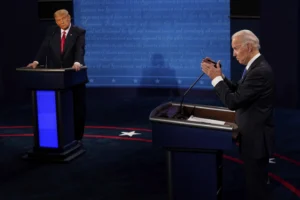The Debates Are a Travesty: Here’s How To Make Them Work

The Debates Are a Travesty: Here’s How To Make Them Work
No, it’s not your imagination: The presidential debates have been getting worse. So bad, in fact, that the candidates have refused to work with the Commission on Presidential Debates, which has presided over the events for 60 years, this year. Instead, the Biden administration is calling the shots on the rules of engagement, and Trump has agreed to show up “anytime, anywhere.” What could go wrong?
Presidential debates once made an important contribution to American civic life and democratic ideals. They should reflect our values as a society and serve to create a better-informed and more thoughtful electorate – not the opposite. That’s why the Open to Debate Foundation, in partnership with researchers at the Princeton Center for the Study of Democracy, analyzed the last 20 years of presidential debates to diagnose the problem and propose solutions. The results we found probably won’t surprise you, but the trends are alarming.
Let’s start with interruptions. Just 20 years ago, interruptions on the presidential debate stage were exceedingly rare – so rare that there was only one in 2004. But fast-forward to 2020, and there were 76 instances in one debate alone. And personal attacks? There were only six before 2016. But between 2016 and 2020, there were more than 60 personal attacks between both sides. Not to mention viewers were exposed to less information over time, with only 20 of the 31 policy topics covered over the last 20 years.
Worst of all, moderators went from losing control once in 2004 to 58 times in 2020.
As CEO of the Open to Debate Foundation, I’ve been producing nonpartisan Oxford-inspired debates – grounded in facts and reasoned analysis – for more than a decade. Our organization produces a weekly debate on a provocative policy question, ranging from funding the war in Ukraine to whether social media is bad for kids’ mental health to abolishing DEI mandates in higher education. We bring the sharpest minds in the world together from opposing sides, and our model is proven to keep the conversation civil, respectful, and substantive.
We’ve presented more than 300 debates and learned that one thing debaters will always do is test the moderator’s boundaries to ultimately break the rules. In our programs, debaters have tried every trick in the book, from reframing questions to evading them, talking over their opponent and repeating talking points over and over again, and our moderator John Donvan has to exercise a firm hand. It is guaranteed that our presidential candidates will try the same. Could we demand they respect the established time limits? Answer the questions asked? Cite facts – real ones? And stop making personal attacks?
Sure, but rules don’t matter unless you have a moderator who is able to enforce them, and a format that empowers moderators to do it. Here are some rules for the moderators that will prevent the debates from devolving into chaos:
- Penalize bad behavior. When one side attacks, interrupts, or speaks over the other, the other side should be awarded a time credit. At the end of the debate, the candidate with the most time left on the clock gets the last word. It incentivizes both sides to stay on point and on topic (and demonstrates much-needed decorum in our discourse norms).
- Turn off the mic. Don’t let candidates go over their allotted time. If they do, mute the microphone. No exceptions.
- No “gotcha” questions. The role of the moderator is to keep the trains running on time and enforce a fair and level playing field for both sides – not to debate the debaters, endorse partisan ideas, or derail the conversation with selective fact-checking.
- Frame opening questions so they are answered with a yes or a no. In a real debate, the clearer the dichotomy, the sharper the arguments. Clearly stated positions give the moderator more to work with editorially and move the conversation forward.
- Call out evasions. Often debaters rely on talking points instead of responding to their opponent’s ideas, or the questions that were asked. Moderators need to call those fouls when they are out of bounds and enforce the rules – not the other way around.
- Forget fact-checking. When AI can be trusted to accurately interpret the historical record and check facts in real time, we should introduce fact-checking into the debates. Until then, let reporters do their work as guardians of the fourth estate and hold our elected officials accountable for the facts they present.
In a real debate, the rules of engagement matter. Facts, evidence, and data are presented in real time by both sides to be scrutinized and discussed through reasoned analysis. Done right, debate is a model for how we can hear opposing points of view, engage respectfully during disagreements, be more informed about policy issues, and better understand the world.
















